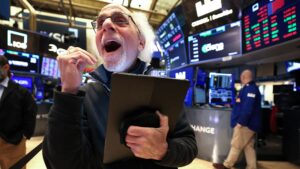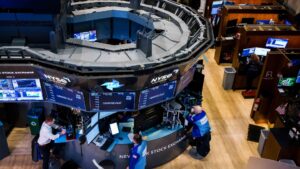Fed Nominee Michael Barr Supports Rewriting Lending Rules, Cautious on Capital Requirements

WASHINGTON—
Michael Barr,
President Biden’s pick to become the government’s most influential bank regulator, told senators that he supports a plan to overhaul how banks lend to lower-income communities and that he would take stock of the financial system before adjusting capital and liquidity requirements.
Mr. Barr, a veteran of the Obama and Clinton administrations, faced questioning Thursday from the Senate Banking Committee at a confirmation hearing to serve a four-year term as Federal Reserve vice chairman for bank supervision.
If confirmed by the Senate, he would be responsible for developing policy recommendations for the Fed board and for overseeing its regulatory staff, which supervises some of the largest U.S. financial firms, including JPMorgan Chase & Co., Bank of America Corp., and
Citigroup Inc.
No Democrats stated they would oppose Mr. Barr’s nomination at the hearing. He can win confirmation without Republican support if Democrats are united in the 50-50 Senate. The banking committee must first vote on Mr. Barr before sending the nomination to the full Senate.
Sen.
Joe Manchin
(D., W.Va.), frequently a moderate swing vote, said this week he planned to support Mr. Barr. Progressive Democrats such as Sen.
Elizabeth Warren
(D., Mass.) also have said they would support him.
At the hearing, Mr. Barr praised a recent proposal from the Fed and two other regulators to overhaul rules for the Community Reinvestment Act, a 1977 law aimed at ending redlining—banks’ historical practice of avoiding lending in certain areas, often lower-income communities, frequently leading to stark economic disparities along racial lines.
“There was an enormous amount of work that’s been put into that and I think that it shows in the proposal,” Mr. Barr said.
If confirmed, Mr. Barr would have a say in how regulators complete that proposal.
Thursday’s hearing yielded few other clues to Mr. Barr’s policy aims should he win confirmation. One early decision revolves around a potential adjustment to how the Fed counts deposits held at the central bank toward banks’ so-called leverage ratio. The Fed allowed a temporary, pandemic-related reprieve from the capital requirements to expire last spring, but it said it would consider a broader revamp to the rule’s treatment of ultrasafe assets. It has yet to do so.
Mr. Barr said he wanted to get a broad view of various bank capital and liquidity requirements before pushing for adjustments to specific rules piece by piece.
The banking system is emerging from the Covid-19 pandemic in strong health, in part because of an aggressive response by monetary- and fiscal-policy makers that stopped a panic and showered the economy with cash.
“If you look at the capital and liquidity in the financial system today, they’re quite strong,” Mr. Barr said.
Mr. Barr also would have a voice on monetary policy when inflation is at a four- decade high and the central bank is trying to engineer a “soft landing,” in which growth slows enough to bring down inflation without triggering a recession.
“Inflation is running far too high, affecting communities across our country,” Mr. Barr said.
Mr. Barr, 56 years old and dean of public policy at the University of Michigan, would round out Mr. Biden’s slate of appointees to the central bank. Fed Chairman
Jerome Powell
and three other appointments were confirmed in recent weeks.
The lack of a Fed bank supervisor since
Randal Quarles,
who previously held the Fed supervision post, departed at the end of last year has slowed decisions on regulatory policy and meant there was no one on the Fed board whose job was to articulate a broad vision for financial oversight
Mr. Biden’s first nominee for the banking-supervision post,
Sarah Bloom Raskin,
withdrew from consideration in March after Mr. Manchin said he couldn’t support the nomination, citing her views on addressing climate change.
At the same hearing, senators heard from two nominees for the Securities and Exchange Commission, Republican Mark Uyeda and Democrat Jaime Lizárraga.
Mr. Uyeda has advised former SEC Chairman
Jay Clayton
and two former Republican commissioners. Since January 2021, Mr. Uyeda has been temporarily assigned to the Senate Banking Committee as securities counsel to the panel’s top Republican, Sen.
Pat Toomey
of Pennsylvania. Mr. Toomey has frequently criticized the policy agenda of the current chairman,
Gary Gensler.
Mr. Lizárraga has served as an aide to House Speaker
(D., Calif.) for nearly 15 years. Though he isn’t well-known among lawyers and lobbyists in the SEC’s orbit, Mr. Lizárraga said in prepared testimony that he played key roles in all financial regulation moving through Congress in recent decades, including the Sarbanes-Oxley Act and Dodd-Frank Act.
The SEC currently comprises three Democratic commissioners and one Republican. If confirmed, Mr. Lizárraga would replace Commissioner
Allison Herren Lee,
a Democrat, who plans to leave once a successor arrives. Mr. Uyeda would fill a vacant seat.
No senators raised objections to either SEC nominee.
—Paul Kiernan contributed to this article.
Write to Andrew Ackerman at andrew.ackerman@wsj.com
Copyright ©2022 Dow Jones & Company, Inc. All Rights Reserved. 87990cbe856818d5eddac44c7b1cdeb8









